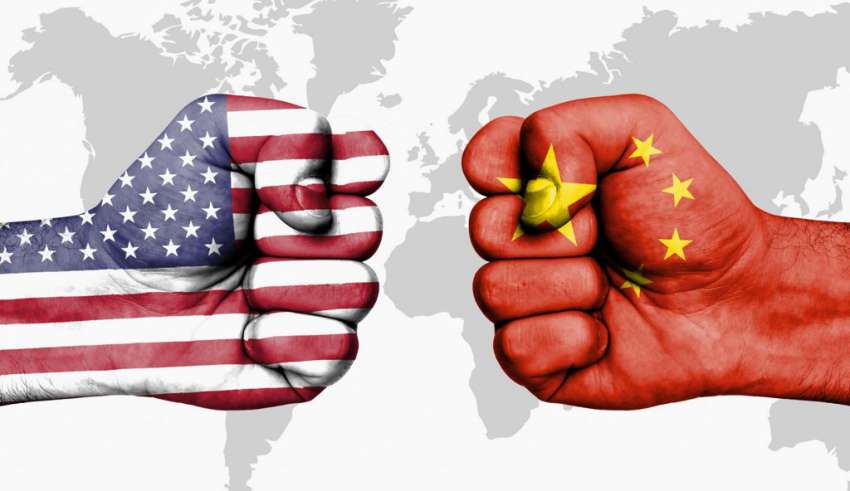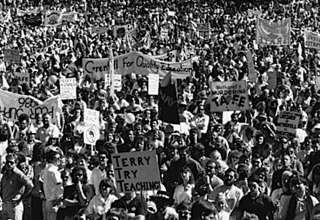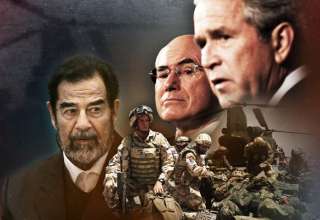By Brian Boyd
(February 2021)
Brian is former Victorian Trades Hall Council Secretary with a long history of advocating for Australia’s independence from US.
Introduction
____ _____
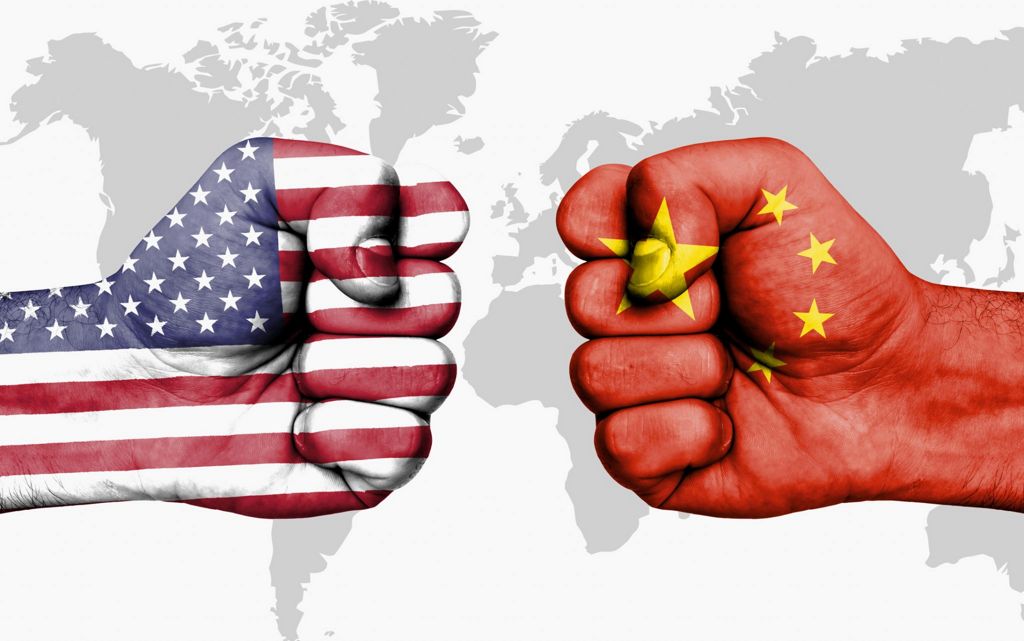 2020 ended with an ever evolving pre-war scenario still in play.
2020 ended with an ever evolving pre-war scenario still in play.
The possibility of outright military conflict between the US and China has increased in probability from around 10% a decade ago to as high as 50% in 2021. Some commentators are suggesting that a trigger could be a miscalculation in the South China Sea and even a new “disruptive US military technology” (1) coming into play.
The recent change to the formal political leadership in the United States does not detract from the main dilemma facing the world, the ongoing and intensifying great power rivalry that could lead to open conflict.
A rising mercantile driven superpower is challenging and established dominant superpower. In every area of trade, investment, technology and economic growth, China and the US are increasingly competing for access to other countries raw materials, markets and excess to labour. This contest is escalating political and military tension, particularly in Australia’s region of the Indo Pacific.
One recent editorial pointed out that “the US will seek support to push back” against “China’s strategy of using it economic heft and share of global trade…” The editorial went on to suggest interestingly that Australia would welcome an approach “not to browbeat or contain China, but to make sure that, along with Washington, Beijing too recommits to a rules-based order”. (2) [Where does such an approach leave the pro-US war hawks in the Australian Parliament calling for the isolation and containment of and the complete economic decoupling with, China?]
It is now no secret that the initiation of a so-called trade war between the US and China, some years ago, has become more openly acknowledged as part of a broader strategy by the US to curtail China’s growing economic influence, impacting on its long established financial and strategic interests.
Australia is caught up, in a somewhat embarrassing ‘sideshow’, within this global test of strength. This is because successive Australian governments of all persuasions have, over many decades, allowed Australia’s sovereignty to be compromised by allowing US military and intelligence facilities to be stationed here. China has no real trade argument with Australia. “Australia’s worsening China relationship is-at its core-a product of our close alliance with the United States”. (3)
Back in November Australian Prime Minister Scott Morrison suggested: “This is a world where there is no need to build global spheres of influence to secure economic opportunity or exert influence, previously only secured by great militaries”. (4) Morrison knows this is not true. He is well aware of the great global military build – up that is occurring, and Australia’s role in it.
The much talked about tussle around Australian-Chinese trade issues hides the fact that Australia is actually a major military, war fighting outpost for the US. This is the essence of why Australia is involved in the heightening US-China undeclared war, and the government knows it.
The Australian government is well aware, for example, that when the South Korean government accepted a US missile defence system back in 2016, this led to a protracted dispute involving many Chinese boycotts affecting South Korean exports, costing an estimated US $8 billion.
A truly independent, self – respecting Australia should demand that the military activities of both the US and China stay out of our region and desist from their destructive economic competition and rivalry, that has the potential for higher levels of economic disruption and open conflict
Australia should be totally independent from all manifestations of imperialism and major power expansionism. Canberra should develop its own brand of diplomacy and statecraft that is less tethered to a pro-war alliance. A smarter prosecuted dialogue can be embarked upon to reflect Australia’s distinctive interests in this part of the world.
Australia’s political elite in Canberra do not want public discussion or debate about how our nation, politically and militarily, is being locked in to the war preparations.
This is not in the interests of peace and a prosperous nation. We should be demanding, through the United Nations and bodies like the World Trade Organisation, a global set of rules for fair trade, where all nation states can get a reasonable price for the goods and services and have their respective labour forces win fair wages and working conditions.
Some government and opposition politicians want to exaggerate and artificially amplify great conspiracies of foreign interference, threats to our national security, widespread penetrations of our political system by ‘agents of influence’ and the undermining of our ‘values’. No evidence of any substance is provided for these repetitive claims.
The US and Australia know they are not threatened by the export of China’s system of government or economic model. There are no domestic elements “taking to the streets”, demanding that the economic and political system operating in China be adopted.
The pro-war hawks do not any focus on the real basis of the current manifestation of great power rivalry in the 21st century and that is, as it always has been, all about economic interests.
Those voices in Canberra want instead a confected debate around conspiracies involving national security which have arisen ‘mysteriously’ in recent years. They want no connection to be made to the rise in great power rivalry over the future of economic spheres of influence globally. None of these pro-war voices worried about taking on China for the last 40 years, until the US called out China when it became the second largest economy in the world.
The new US administration
—— ——- ————–
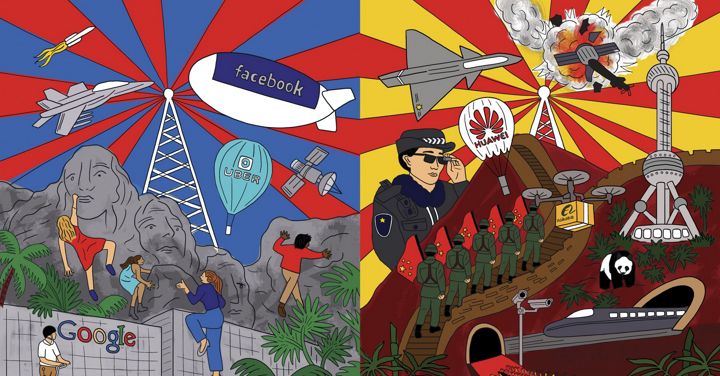 In the second week of February the new US president Joe Biden had no such qualms about describing the US-China relationship was about “extreme competition”, complaining particularly about China’s ‘economic mercantilism’, and its ‘unfair and illegitimate economic practices’.
In the second week of February the new US president Joe Biden had no such qualms about describing the US-China relationship was about “extreme competition”, complaining particularly about China’s ‘economic mercantilism’, and its ‘unfair and illegitimate economic practices’.
In Washington it has been openly considered for some time that China is “the US’s Number One strategic adversary, and the primary challenge on the world stage”.(5)
Australia’s interests have always been tied to the US’s original optimistic strategy for over four decades, that diplomatic and economic engagement with China was the way forward. The US is now admitting that this approach has failed. The level of economic growth and development of China is impacting on the US’s long established hegemonic role. In the US, no matter who runs the administration, this geo-political reality has to be addressed.
Many in the so-called ‘expert’ commentariat are asking how this economic and strategic competition can be managed, especially finding the right balance of power. It is widely recognised that China will continue to compete for economic influence across the various regions of the world, especially in terms of foreign investment markets, technological markets, capital markets and currency markets. It is reported that officials in the US and China are currently searching for a formula to manage their relationship, with the apparent aim not to “make conflict, and even war, seem inevitable”.
Biden said he is committed to pursuing advancing America’s global interests. It is reported that he went to the Pentagon with the message that his government will continue to have China as a top priority and he ordered a military-wide review of America’s broad strategy, operational concepts, technological status and force posture around the world, in terms of this priority.
This linking, in the same breath, of the economic competition between rival major powers to war preparations, is a crucial point for the wider public to appreciate and understand.
One pro–US war hawk recently gave some acknowledgement to the core basis for taking on China. He pointed to the economic system in China that had been “seeking to distort markets and prices” and had become in some areas of trade a “dominant supplier”. He claimed China had “expansionary ambitions” and wanted to rejig “globalisation” to suit its interests. He argued that the US must remain “the indispensable nation”, especially with respect to “supply chains” and “innovation, expertise, and finance”. He lamented that the US’s “unipolar moment of uncontested power after the implosion of the Soviet Union is over”, and pleaded that America, in the current climate “emerge” as the major player in all key economic sectors. (6).
Even Australia’s most hawkish newspaper, when endorsing via an editorial, Biden’s China position, acknowledged that at its core the US would continue to “confront” China’s so-called “economic abuses”.(7).
President Biden also said it was time to “get tough” on Russia, saying “the days of America rolling over” for Putin were over.
Meanwhile, post Brexit, Britain and the EU have expressed plans to have a greater role in the global economy.
Military expansion and expenditure on the rise
______ ____ _________________
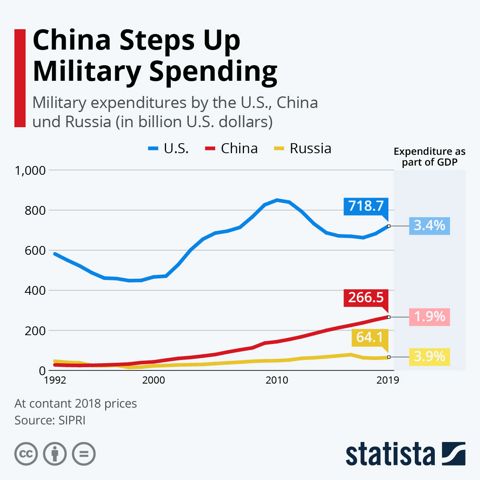 While it is increasingly important to explain that the essence of great power rivalry is about competition in economics and trade, it is becoming equally important to expose that this tension is deliberately being reflected in exponential expenditure on military hardware and pre-war preparations.
While it is increasingly important to explain that the essence of great power rivalry is about competition in economics and trade, it is becoming equally important to expose that this tension is deliberately being reflected in exponential expenditure on military hardware and pre-war preparations.
This ’war talk’ undercurrent surfaces occasionally in sections of the mainstream media, but is often accompanied with a prepared ‘propaganda spin’ overlay.
The state power apparatus of all governments, especially the big economic competitors, indulge in blurring wider public understanding of what is happening behind the scenes.
As a middle power, currently locked in to the military machinations of one of the major powers, Australia is no exception to creating the necessary ‘spin’ for public consumption. The government is backed up by a professional grouping of pro-war, far, right-wing, US leaning “hawks” e.g. intelligence agencies, hand- picked journalists and academics, professional think tank ‘experts’, and co-opted politicians, who have no qualms in coordinating together misrepresentations, exaggerations and blatant misinformation in this current period of pre-war atmospherics.
For example much is made of the occurrence of cyber warfare, cyber hacking and intelligence gathering operations. The fact is ALL nation states conduct intelligence and spying operations. All of the major powers , in particular, have elaborate intelligence gathering apparatus. They have been spying on each other for years.
The US, China, Russia, Britain, Germany, Japan, France and India for example, all have spied on each other for economic and military information over the decades.
The US has the biggest global intelligence operation of them all. Australia plays a big part in the US apparatus, with bases like Pine Gap and North West Cape being key elements.
In recent times some of these pro-US ‘hawk’ elements have instigated a “political warfare” campaign to enhance the US position publicly in its competition with China. China has embarked upon its own political warfare response. The ‘hawks‘ are demanding China, to not only be described as a ‘strategic competitor’ but as an ‘existential threat’, to the US!
A current mantra of some of the pro-war ‘hawks’ is that the US should unite with all the other countries that have disputes with China and formulate and implement ‘an effective response’. Much is made of the long-standing ‘Five Eyes’ intelligence arrangements involving Australia, the US, Britain, Canada and New Zealand and how this grouping has the multilateral approach already underway. Alliances with Japan, India and the EU bloc are being formulated. Britain is reported to be sending its biggest flotilla of warships to Asia in the generation.
While arguing that the overall aim is to ‘prevent war, not start one’, the ‘hawks’ push that Australia is moving too slowly to provide the necessary support for a broader defence force with ‘’real teeth’’.(8)
The role and influence of the pro-war ‘hawks’ deserves wider public scrutiny and investigation.
If the Australian public were to believe every word of the regular pro-war commentators in the media, China and Russia are conducting harmful, destructive cyber warfare every day (and probably are), but the US, Australia, Britain, Canada and New Zealand only conduct benign and reasonable intelligence operations, with no malicious intent!
The growth in military hardware and the expanding military footprint of the superpowers, and other major powers, has to be of concern to all war wary citizens.
It is important that a wider public audience take more interest in the developing construct of war preparations underway.
We see only glimpses of some of these preparations because of the media bias.
Diplomatic Rift
—— ————
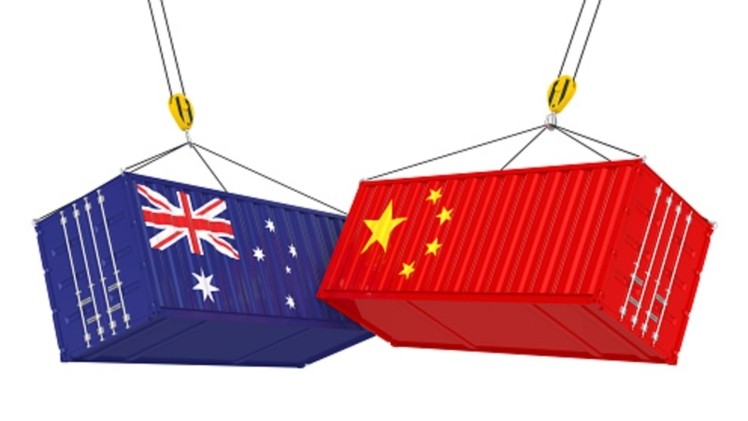 It has to be recognised that the current tensions between Australia and China over trade cannot be fixed until the US-China conflict is addressed. A number of commentators and ex-politicians have recently floated the idea that the Australian government should “re-stabilise” its relationship with China. This wishful thinking is based on the assumption that the differences between Australia and China are an isolated phenomenum. That the relationship has become so bad because of issues solely resting between the two countries.
It has to be recognised that the current tensions between Australia and China over trade cannot be fixed until the US-China conflict is addressed. A number of commentators and ex-politicians have recently floated the idea that the Australian government should “re-stabilise” its relationship with China. This wishful thinking is based on the assumption that the differences between Australia and China are an isolated phenomenum. That the relationship has become so bad because of issues solely resting between the two countries.
This description is naïve at best and disingenuous and misleading at worst.
Trade, as has been stated, is not at the heart of the matter. In fact recently released trade figures show that the overall exports value from Australia to China have actually increased. It is the Australian government’s active involvement in war preparations, intelligence operations and a US required anti- China diplomatic offensive in the Indo-Pacific region, is central to the breakdown in Australian-China relations.
This does not mean that Australia has to accept poor treatment from China. Far from it. Australia is entitled to have self-respect on the world stage. China is not acting like a modern and progressive country with respect to its relations with many other countries. However the Australian public are entitled to know the real bases of the current diplomatic rift.
The confected ‘trade war’ that the US began some years ago, is all about a wider strategy of responding to China’s economic success. The ‘containment’ campaign is increasingly accompanied with ideological McCarthyist-style dialogue through what has become known as megaphone diplomacy. China conducts its own counter-attacks.
In November 2020 Australian Prime Minister Scott Morrison in a speech rejected any suggestion that Australia wanted to contain or restrict China. “From Australia’s view, it’s not containment. We want a happy coexistence, respecting each other’s sovereignty and systems in a mutually beneficial relationship”. He went on to comment that the world is one “shaped by decades of growing economic inter- dependence… The Indo-Pacific region which shape the destiny of the world in the 21st century”, he said.
This is glib, even dishonest commentary. It is well documented that there is much effort being put into integrating, even further, the Australian defence systems into the US global military apparatus. It is also no secret that amongst the Federal politicians in Canberra, both within Morrison’s Liberal party and also in the Australian Labor Party, there is an organised group advocating pre-war preparations aimed at supporting the US going into open conflict with China, sooner rather than later.
Prime Minister Morrison does not contradict these pro-war activists.
There is no effort to define Australia as a genuine emerging middle-power on the global stage, advocating peaceful and mutually beneficial solutions to the world’s economic contradictions.
The pro-US war hawks repeatedly exaggerate intelligence gathering activities by China. They know full well that all countries gather intelligence on each other-economic, information technology, political, industrial and social are all areas where information is gathered. For decades this reality suited all nation states. It occurred ‘below the surface’ with a ‘nod and a wink’.
Now that the US superpower has been wrong-footed in terms of its global economic empire since World War II being challenged, the intelligence gathering activity issue is being used as part of wider pro-war atmospherics.
War Triggers
____ ____-
While there is much speculation about how a balance can be struck in the intense competition between the US and China there is also much speculation about how open conflict and war could eventuate. Trigger scenarios are increasingly being openly discussed.
Some argue that China is buying time so that its military, security and intelligence machinery can achieve parity with, or even superiority to, the US war machine. Economic forecasters are now suggesting that China will overtake the US as the world’s biggest economy before 2030. This latter eventuality is seen by the pro-war camp as justification for military operations alone.
The Biden administration has warned US big business that China’s advances in transportation, infrastructure improvements, new initiatives in rail and rapid advances in electric-vehicle technology pose a major competitive threat to the US. He recently openly chastised America’s corporate sector saying: ‘are you going to allow China “to eat our lunch?” ‘
Currently there is also major speculation about China’s long standing plans to re-incorporate Taiwan.
Many pro-war hawks are predicting that this will be, and should be, the trigger for open conflict. Peter Varghese (former Australian intelligence agent) speculates: “The American system is hardened now (towards China). The consensus is that the system (under Biden) would need to take a pretty hard line from the beginning. This could require the Americans being willing to contemplate conflict… If they (the US) find themselves having to take military actions, [or] not fighting but making some deployments, it’s possible they might want token allied military presence”. (9)
Another self-styled ‘expert’ suggested, to help avoid military crisis or conflict or a debilitating cyber- attack, it would be good if the US and China signed “a convention banning various forms of robotic warfare”. The inference being that the use of such technology could make conflict easier to occur. (10)
Regardless, increasing speculation about war ‘triggers’ should, in itself, concern a war weary world.
Summary
___ ____
Australia needs to act as sovereign, independent, middle power with dignity. We should not be regarded on the world stage as a client state.
Having this view does not mean that we should compromise our sovereignty and the country’s economic, political and social interests in any way. We deserve relationships with the US, China and any other country based on mutual respect. We should reject simplifying the debate around the current geo-strategic environment and definitely should reject that we have to make a “choice” between rival great powers.
Australia’s position should always be firstly to oppose war and conflict. And secondly supports global mechanisms that encourage fair trade and fair treatment of the working people of any nation.
********
END NOTES:
1. AFR, ‘Seek an edge in the search for yield’, Christopher Joye, 3/1/21
2. AFR, editorial: ‘Biden restores a sense of ease to our core alliance’, 23/1/21
3. AFR, ‘Australia needs America to follow global rules too’, Ben Scott, 15/12/20
4. AFR, editorial: ‘Deftness with China is the biggest question’, 29/12/20
5. Australian, ‘President puts Beijing, Tehran at top of foreign policy agenda’, 9/2/21
6. Australian, ‘Biden shows he is no Obama and is up for the fight’, John Lee, 9/2/21
7. Australian, editorial: ‘Biden’s world outlook a plus’, 6/2/21
8. Weekend Australian, ‘Fighting that Dragon’, Alan Dupont, 12/12/20
9. Australian, ‘China’s growing ideological stance means more trouble ahead’, Greg Sheridan, 13/2/21
10. Weekend Australian, ‘Rules to help avoid global calamity’, Kevin Rudd, 13/2/21.

